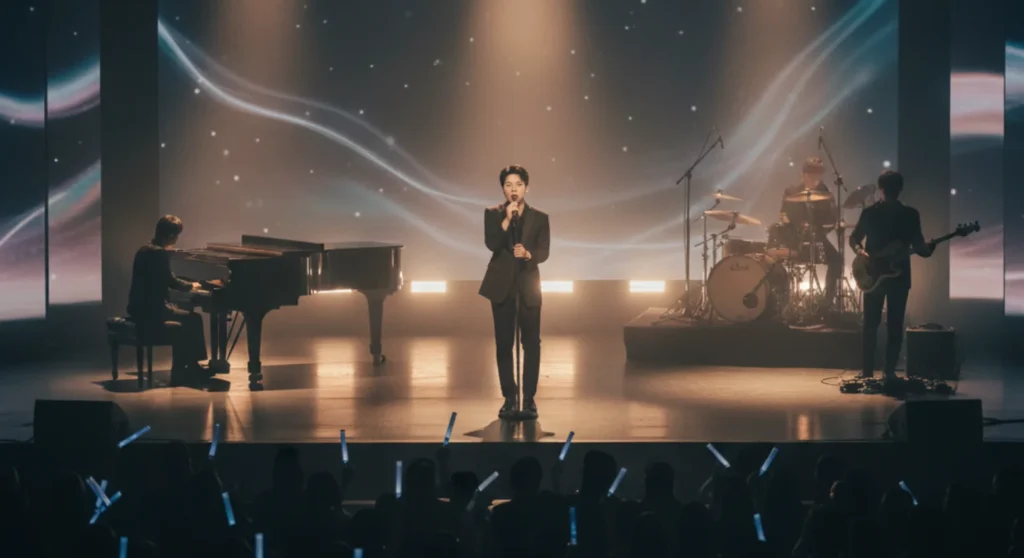Have you ever listened to a Chinese song and felt like it was telling a story just for you? From beautiful Chinese ballads to modern C-pop hits, storytelling in Chinese music has a special way of connecting with people. Chinese artists storytelling isn’t just about the words—they use music, emotions, and culture to create songs that feel alive and meaningful.
In this blog, we’ll explore how Chinese music lyrics carry deeper meaning, the ways artists tell their stories through songs, and the emotional storytelling that makes these tracks unforgettable. Whether you’re curious about the meaning behind Chinese songs or want to understand how narrative songs in China are made, this guide will give you a closer look at the stories hidden in the music.
By the end, you’ll understand why these songs aren’t just for listening—they’re a way to feel, remember, and connect.
Table of Contents
Evolution of Storytelling in Chinese Music
Have you ever thought about how Chinese songs tell such powerful stories? The way storytelling in Chinese music has grown is really interesting. It didn’t happen overnight—Chinese artists storytelling has roots that go back hundreds of years.
Here’s a simple look at how it evolved:
- Folk Tales and Legends: Long ago, songs were based on local stories and events. They were more than music—they helped people remember and share their history.
- Classical Poetry Influence: Many songs borrowed ideas from Chinese poetry, making the lyrics deep and meaningful. This gave songs a way to express emotions and ideas beautifully.
- Modern Pop Songs: Today, Chinese pop songs with stories mix old traditions with new sounds, appealing to both young and older listeners.
- Keeping Culture Alive: These songs do more than entertain—they preserve Chinese music culture and connect people to their past.
Storytelling in Chinese music is about more than words. It’s about feelings, culture, and history coming together in a way that makes every song memorable.
Techniques Chinese Artists Use to Tell Stories
Have you noticed how some Chinese songs make you feel like you’re living the story? That’s because storytelling in Chinese music isn’t just about the words—it’s about creating an experience that touches your emotions.
Here’s how Chinese artists do it:
- Story-like Lyrics: Many songs are written like short stories, with a clear beginning, middle, and end. This makes it easy to follow the emotions and events.
- Symbols and Metaphors: Artists often use symbolic words to show deeper meanings. Even a small line can carry big emotions or cultural ideas.
- Music That Feels: The melody and instruments help tell the story too. Soft piano or dramatic strings can make you feel happy, sad, or nostalgic along with the lyrics.
- Cultural References: Some songs include parts of Chinese history or traditions, giving listeners a sense of the culture behind the story.
- Mixing Old and New: Many modern Chinese pop songs with stories combine traditional sounds with contemporary beats, making the stories feel fresh and relatable.
By using these techniques, Chinese music lyrics meaning becomes more than words—it’s a way to feel, understand, and connect with the story behind the song.
Impact on Listeners
Have you ever felt chills or tears while listening to a Chinese song? That’s the power of storytelling in Chinese music. When artists craft their songs with care, listeners don’t just hear the music—they experience the story.
Here’s how these songs leave a mark on people:
- Emotional Connection: Narrative songs in China often touch on universal feelings like love, loss, and hope. This emotional storytelling in music helps listeners relate to the song on a personal level.
- Cultural Understanding: Songs often include cultural symbols and references, giving listeners a glimpse into Chinese traditions, history, and values. It’s a way to learn and connect without even realizing it.
- Memorable Experiences: Songs with strong stories stick in your mind longer. You might remember a lyric or a melody because it made you feel something real.
- Personal Interpretation: Many Chinese music lyrics meaning is open to interpretation. Listeners can connect their own experiences to the story, making each song feel unique to them.
By blending lyrics, melody, and culture, Chinese artists storytelling goes beyond entertainment. It creates moments that resonate, educate, and move listeners in ways that stay with them long after the song ends.
Case Studies of Prominent Artists
Have you ever wondered how your favorite Chinese songs tell such powerful stories? Looking at some well-known artists can make it easier to understand how narrative songs in China really work.
Here are a few examples:
- Wang Leehom: He mixes modern music with traditional Chinese sounds. His songs often tell stories about love, culture, and identity, showing how Chinese artists storytelling can be both personal and meaningful.
- Jay Chou: Known for turning songs into mini-movies, his music combines strong melodies with story-driven lyrics. From historical tales to love stories, his songs show how storytelling in Chinese music can feel vivid and real.
- Faye Wong: Her songs focus on emotions and let listeners interpret the story themselves. This is a great example of emotional storytelling in music, where everyone experiences the song in their own way.
- Other Famous Songwriters: Many Chinese songwriters mix old traditions with modern styles, keeping narrative songs fresh and interesting.
Looking at these artists, it’s clear that Chinese song stories are more than just lyrics—they are experiences. Every song is carefully made to connect with listeners emotionally, culturally, and personally.
Role of Modern Platforms in Storytelling
Have you noticed how songs today feel more personal and easy to reach than ever before? Social media and streaming platforms have changed the way Chinese music storytelling connects with listeners, helping artists share their stories with fans all over the world.
Here’s how these platforms make a difference:
- Streaming Services: Platforms like QQ Music and NetEase Cloud let artists release narrative songs instantly. You can listen to Chinese song stories anytime, making the experience more personal and immersive.
- Music Videos: Many Chinese pop songs with stories now come with cinematic music videos. The visuals help bring the lyrics to life and make the story easier to feel and understand.
- Social Media: Fans can talk about, share, and interpret songs on Weibo or TikTok. This keeps the storytelling alive and lets listeners connect with the music in their own way.
- Global Audience: Modern platforms help narrative songs in China reach listeners around the world, introducing Chinese music culture to new audiences.
Thanks to these platforms, Chinese artists storytelling isn’t just about lyrics anymore. Music has become an experience you can watch, feel, share, and enjoy wherever you are.
Conclusion
Have you ever wondered why some Chinese songs stay in your mind long after you’ve heard them? It’s because storytelling in Chinese music is more than just words—it’s an experience. From emotional storytelling in music to narrative songs in China, every track is made to connect with listeners on a personal level. The meaning behind Chinese songs often mixes feelings, culture, and history, making each song feel like a small journey.
Artists like Wang Leehom, Jay Chou, and Faye Wong show how Chinese song stories can be emotional, creative, and memorable. With modern platforms, these stories can reach people all over the world, letting fans enjoy, share, and feel the music in new ways.
Next time you listen to a Chinese song, try paying attention to the lyrics and melody. You might discover a story that moves you, inspires you, or makes you see the culture behind the music in a whole new way.
FAQs
1. What makes storytelling in Chinese music special?
Chinese songs often combine emotions, culture, and story-like lyrics, making each song feel like a mini-story rather than just music.
2. Can I enjoy the meaning of Chinese songs without knowing Chinese?
Yes! Music, emotions, and music videos often help tell the story, so you can feel the meaning even if you don’t understand the words.
3. How do modern platforms change Chinese music storytelling?
Streaming apps, social media, and music videos let artists share their stories with fans around the world and create new ways to experience the songs.




